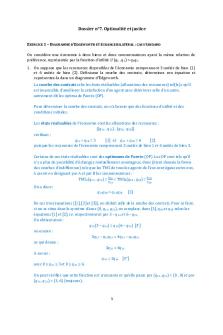Chapter 7 Marketing 2016 PDF

| Title | Chapter 7 Marketing 2016 |
|---|---|
| Course | Marketing Principles |
| Institution | University of Massachusetts Lowell |
| Pages | 2 |
| File Size | 77.1 KB |
| File Type | |
| Total Downloads | 96 |
| Total Views | 176 |
Summary
Chapter 7 Vocabulary...
Description
Chapter 7: Business-to-Business Marketing Business-to-Business Marketing (B2B): The process of buying and selling goods or services to be used in the production of other goods and services, for consumption by the buying organization, or for the resale by wholesalers and retailers. Derived Demand: The linkage between consumers’ demand for a company’s output and its purchase of necessary inputs to manufacture or assemble that particular output Reseller: Marketing intermediary that results manufactured products without significantly altering their form. Wholesaler: Firm engaged in buying, taking title to, often storing, and physically handling goods in large quantities, then reselling the goods (usually in smaller quantities) to retailers or industrial or business users. Distributor: A type of reseller or marketing intermediary that results manufactured products without significantly altering their form. Distributors often buy from manufacturers and sell to other business like retailers in a B2B transaction. Request for Proposals (RFP): A process through which buying organizations invite alternative suppliers to bid on supplying their required components. Web Portal: An Internet site whose purpose is to be a major starting point for users when they connect to the web. Buying Center: The group of people typically responsible for the buying decisions in large organizations. Initiator: The buying center participant who first suggests buying the particular product or service. Influencer: The buying center participant whose views influence other members of the buying center in making the final decision. Decider: The buying center participant who ultimately determines any part of or the entire buying decision – whether to buy, what to buy, how to buy, or where to buy. Buyer: The buying center participant who handles the paperwork of the actual purpose. User: The person who consumes or uses the product or service purchased by the buying center. Gatekeeper: The buying center participant who controls information or access to decision makers and influencers. Organizational Culture: Reflects the set of values, traditions, and customs that guide a firm’s employees’ behavior Boycott: A group’s refusal to deal commercially with some organization to protest against its policies Autocratic Buying Center: A buying center in which one person makes the decision alone, though there may be multiple participants. Democratic Buying Center: A buying center in which the majority rules in making decisions. Consultative Buying Center: A buying center in which one person makes the decision but he or she solicits input from others before doing so. Consensus Buying Center: A buying center in which all members of the team must reach a collective agreement that they can support a particular purchase. White Papers: In B2B context, white papers are a promotional technique used by B2B sellers to provide information about a product or service in an educational context, thereby not appearing like a promotion or propaganda.
New Buy: In a B2B setting, a purchase of a good or service for the first time; the buying decision is likely to be quite involved because the buyer or the buying organization does not have any experience with the item. Inbound Marketing: Marketing activities that draw the attention of customers through blogs, Twitter, LinkedIn, and other online sources, rather than using more traditional activities that require having to go out to get customers’ attention, such as making a sales call. Modified Rebuy: Refers to when the buyer has purchased a similar product in the past bus has decided to change some specifications, such as the desired price, quality level, customer service level, options, or so forth. Straight Rebuy: Refers to when the buyer or buying organization simply buys additional units of products that have previously been purchased....
Similar Free PDFs

Chapter 7 Marketing 2016
- 2 Pages

Marketing - Chapter 7 - Practice
- 18 Pages

Chapter 7 Business Marketing
- 34 Pages

Marketing 7
- 3 Pages

Pro Archia 2016-7
- 30 Pages

Marketing Week 7 notes
- 3 Pages

Hoofdstuk 7 marketing pdf
- 6 Pages

Nhóm 7- Samsung- Marketing
- 77 Pages

Práctica 7 - IKEA - Marketing
- 7 Pages

2016 17 Dossier 7 Corrigé
- 6 Pages
Popular Institutions
- Tinajero National High School - Annex
- Politeknik Caltex Riau
- Yokohama City University
- SGT University
- University of Al-Qadisiyah
- Divine Word College of Vigan
- Techniek College Rotterdam
- Universidade de Santiago
- Universiti Teknologi MARA Cawangan Johor Kampus Pasir Gudang
- Poltekkes Kemenkes Yogyakarta
- Baguio City National High School
- Colegio san marcos
- preparatoria uno
- Centro de Bachillerato Tecnológico Industrial y de Servicios No. 107
- Dalian Maritime University
- Quang Trung Secondary School
- Colegio Tecnológico en Informática
- Corporación Regional de Educación Superior
- Grupo CEDVA
- Dar Al Uloom University
- Centro de Estudios Preuniversitarios de la Universidad Nacional de Ingeniería
- 上智大学
- Aakash International School, Nuna Majara
- San Felipe Neri Catholic School
- Kang Chiao International School - New Taipei City
- Misamis Occidental National High School
- Institución Educativa Escuela Normal Juan Ladrilleros
- Kolehiyo ng Pantukan
- Batanes State College
- Instituto Continental
- Sekolah Menengah Kejuruan Kesehatan Kaltara (Tarakan)
- Colegio de La Inmaculada Concepcion - Cebu





